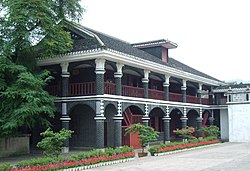Zunyi Conference
| Zunyi Conference | |||||||||||

Site of the meeting in Zunyi
|
|||||||||||
| Traditional Chinese | 遵義會議 | ||||||||||
|---|---|---|---|---|---|---|---|---|---|---|---|
| Simplified Chinese | 遵义会议 | ||||||||||
|
|||||||||||
| Transcriptions | |
|---|---|
| Standard Mandarin | |
| Hanyu Pinyin | Zūnyì huìyì [tswə́nî xwêiî] |
| Gwoyeu Romatzyh | Tzuenyih hueyyih |
| Wade–Giles | Tsun-i hui-i |
The Zunyi Conference (simplified Chinese: 遵义会议; traditional Chinese: 遵義會議; pinyin: Zūnyì huìyì) was a meeting of the Communist Party of China (CPC) in January 1935 during the Long March. This meeting involved a power struggle between the leadership of Bo Gu and Otto Braun and the opposition led by Mao Zedong. The result was that Mao left the meeting in position to take over military command and become the leader of the Communist Party. The conference was completely unacknowledged until the 1950s and still no detailed descriptions were available until the fiftieth anniversary in 1985.
In August 1934, with the Red Army depleted by the prolonged Chinese Civil War, a spy placed by Zhou Enlai in the KMT army headquarters in Nanchang brought news that Chiang Kai-shek was preparing a major offensive against the Communist capital, Ruijin. The Communist leadership decided on a strategic retreat to regroup with other Communist units, and to avoid annihilation. The original plan was for the First Red Army to link up with the Second Red Army commanded by He Long, thought to be in Hubei to the west and north. Communications between divided groups of the Red Army had been disrupted by the Kuomintang campaign, and during the planning to evacuate Jiangxi, the First Red Army was unaware that these other Communist forces were also retreating westward.
Initially the First Red Army, with its baggage of top communist officials, records, currency reserves and other trapping of the exiled Chinese Soviet Republic, fought through several lightly defended Kuomintang checkpoints, crossing the Xinfeng River and through the province of Guangdong, south of Hunan and into Guangxi. At the Xiang river, Chiang Kai-shek had reinforced the KMT defenses. In two days of bloody fighting, 30 November to 1 December 1934, the Red Army lost more than 40,000 troops and all of the civilian porters, and there were strongly defended Nationalist defensive lines ahead. Personnel and material losses after the battle of the Xiang river affected the morale of the troops and desertions began. By a 12 December 1934 meeting of Party leaders in Tongdao, discontent with Bo Gu and Otto Braun appeared. Under these conditions, the Communists met in Zunyi to reshuffle the Party politburo.
...
Wikipedia
